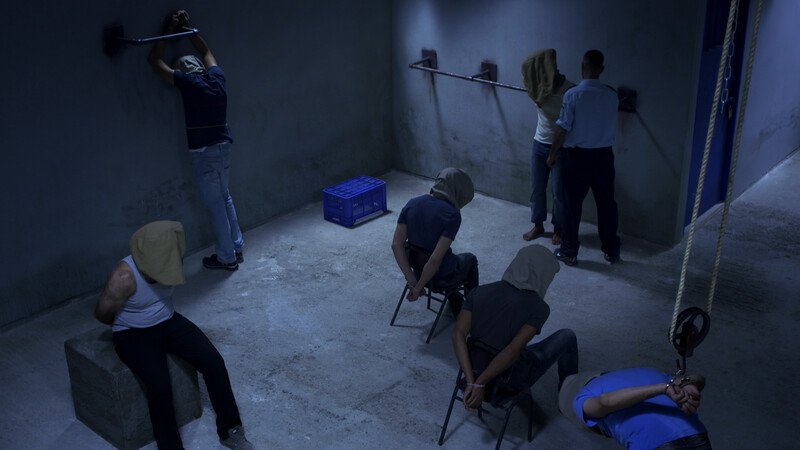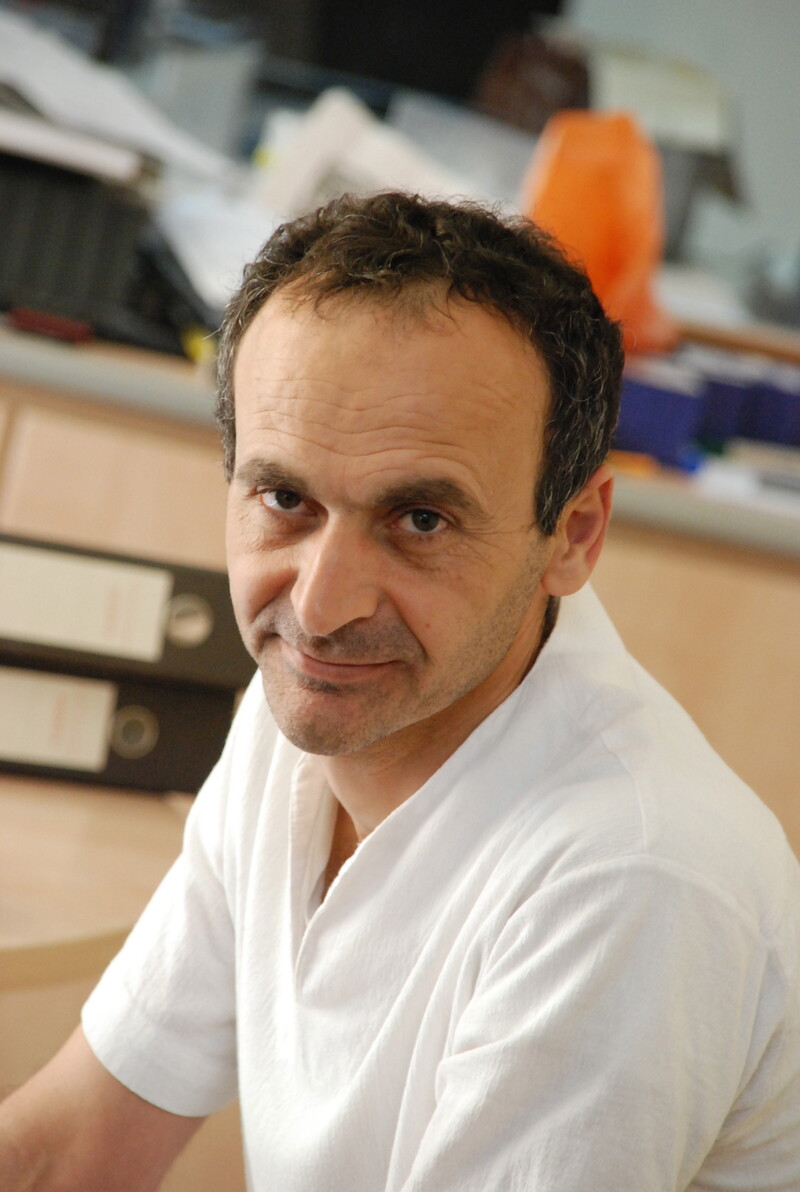The Electronic Intifada 14 November 2017

A scene from Raed Andoni’s Ghost Hunting.
Somewhere in Ramallah, footsteps echo against the concrete of an empty warehouse basement. Raed Andoni guides a handcuffed and hooded man into a cavernous, gray room, his hand on the man’s shoulder.
“Here?” Andoni asks the hooded man, whose sight is blocked and hearing muffled.
“Yes,” the man replies, and Andoni lifts off the hood to reveal Mohammed Khattab, family man and former political prisoner.
Khattab, or Abu Atta, is a warm and fatherly figure, calm despite deeply repressed trauma from his time in prison, as the film reveals.
He exhales, looks at Andoni and the two men share a smile – not between jailer and jailed, but between comrades – in contradiction to the tension built to this point in the film.
So opens Ghost Hunting, director Raed Andoni’s latest genre-blurring feature which abandons standard portrayals of interrogation and imprisonment for an understated glimpse into the chaos that occupies and sometimes consumes prisoners’ minds.
The loose narrative depicts Abu Atta’s real encounters with the cruelty of Israel’s penitentiary system. But when the director cuts, the camera keeps rolling.
Moving between fiction and documentary, Ghost Hunting leaves room for its subjects to simultaneously express their deepest emotions from within the safety of fiction and also display their enduring trauma. Merging the two genres together translates the prisoners’ anxieties to the viewer; visually, it portrays an inability to distinguish a nightmare from being awake.
A very Palestinian experience
While familiar to the incarcerated everywhere, the film specifically speaks to the experience of the more than 800,000 Palestinians who have passed through Israeli detention, jail and prison.
First released at the Berlin International Film Festival or Berlinale in February this year, where it won first prize for best documentary, Ghost Hunting made its way to Washington, DC in October, where it showed at a sold-out opening night at the seventh annual DC Palestinian Film and Arts Festival.
After the screening, Randa Wahbe, a former international advocacy officer at Addameer, a Palestinian human rights group, spoke about solidarity with Palestinians prisoners tried by Israeli military courts, where the conviction rate is more than 99 percent.
Palestinian prisoners are frequently tortured, psychologically and physically, held in interrogation for up to 75 days and often denied access to a lawyer for the majority of that time, said Wahbe. The film reveals the “depth of what happens [behind the statistics] and how long it stays with the prisoner.”
The effect on Palestinian society has been devastating, she added.
“This is exactly why incarceration is used as a tool of colonization and as a tool of occupation,” Wahbe told The Electronic Intifada. “It is an effective tool at trying to break down social structures.”
Ghost Hunting shows the minute pressures exerted by the system of incarceration which, she said, succeeds when it breaks the spirit of prisoners.
“The solidarity and the community that’s built,” as well as the individual resistance of the mind, is “a way to remember why they’re in prison, that they’re fighting for their nation and that is really what is at the center of it,” according to Wahbe.
Searching for Ghosts
Andoni assembled a cast entirely of former prisoners by placing a small ad in a Ramallah newspaper, he explains in the film. The ad sought former prisoners with some experience in architecture, general contracting or acting.
The viewer sees the casting process in one of the first scenes; Andoni sits on one side of a flimsy white desk interrogating ex-prisoners on their experiences the way an Israeli agent might press a current prisoner about their political affiliations.
The camera never leaves the gray room; it bears witness as former political prisoners, among them Mohammed Khattab, Atef al-Akhras, Adnan al-Hatab, Abdallah Moubarak, Ramzi Maqdisi and Andoni himself, rebuild from collective memory the infamous interrogation center in Jerusalem’s Russian Compound.
Their political affiliations are deliberately left out. With between 15 to 20 percent of the Palestinian population “at least jailed once,” said Andoni, “the reasons are not important.”
Andoni was born in Ramallah in 1967, the same year Israel occupied the West Bank. In 1985, he was arrested by Israeli soldiers and taken from his Beit Sahour home near Bethlehem to the Russian Compound.
Charged with belonging to a faction of the Palestine Liberation Organization, a young Andoni was interrogated, tortured and imprisoned for a year – an experience that he said will never leave him.
Making Ghost Hunting was therefore not a question of “how” or “why” but “when,” Andoni said.
“This issue has been living with me since I was arrested at the age of 18, so the story is part of my unconscious behavior – like something living inside of me,” he told The Electronic Intifada. “As a filmmaker, as an artist, I think it’s about time to express these deep emotions that I experienced.”
Freedom of the mind
Not without a sense of humor, Andoni recalls the feeling of physical imprisonment, noting that for one year the only freedom he found was in his imagination.
“My first lesson in cinema was in that interrogation center,” he joked. “I thank the Israelis for teaching me cinema.”
Andoni says the idea for the film came as part of an effort to confront his trauma.
“I asked myself what could happen if I brought a group of ex-prisoners [together] and asked them to rebuild the interrogation center,” he said.
“But the moment the film started and I started to meet the characters, my script [became] useless.”
The former prisoners – including Maqdisi, the only professional actor in the group, who himself spent a year in prison – bring their own insight to Ghost Hunting.
Much of the film shows the process of drawing, planning and physically reconstructing the interrogation center under the quiet direction of Abu Atta.
When Adnan al-Hatab finishes reconstructing one of the cells, he calls over Abu Atta to examine the shade of gray of the cell’s interior.
Abu Atta approves the color and squeezes into a cell with barely enough room for a man to stand and turn around in. In what seems to be a playful gesture, he hunches down and smiles at the camera. But this is the kind of cell, the viewer is reminded, where Abu Atta spent 19 days of interrogation and torture.
Ghost Hunting has many such scenes, where the brutality of imprisonment is the underlying context but not the story.
Prisoners yesterday, comrades today

Raed Andoni
Searching for this specific balance would have been impossible, Andoni said, if he was not an ex-prisoner himself. Forging relationships with his subjects was easier because he was not an outsider, both in regards to prison but also based on his own participation as a character in the film.
“[The cast] don’t feel that I’m a stranger, that they have to explain to me what prison is,” he told The Electronic Intifada. “We are already in front of that; that is behind us.”
Acquainted with the varied perceptions of prisoners within larger Palestinian society, Andoni said from the beginning he never approached the cast as victims “who need a kind of therapy … I would not do such a film.”
“We are all survivors who went through an extraordinary experience,” he told The Electronic Intifada. “This film was done with the pride of sharing … not with victimizing.”
In fact, the victim narrative so often applied to Palestinians undermines the collective struggle for liberation, the director argued.
“I think to free Palestine first we have to free our souls and believe in ourselves; if internally we are free, freeing the land is a matter of time,” he said.
“[If] we start to see ourselves as the victims, begging for support and help and money and funds, I think this is a kind of occupation of the soul.”
Weaponizing “tolerance”
The only scene that is entirely fictionalized in the film is one in which Anbar Ghannan, playing an Israeli interrogator, makes sexual advances on Ramzi Maqdisi, playing Ghannan, who was an actual victim of sexual assault by an Israeli guard.
Where one might expect this to be a commentary on how Israel markets itself as the only safe place for LGBTQ individuals in the region while simultaneously weaponizing the notion in the form of sexual assault – the scene has implications far deeper than criticism of this hypocrisy.
As the tension builds, a defiant Maqdisi finally breaks the nerve of the interrogator when he asks: “How does your fiancée stand you?”
At this, he is beaten and pushed against the wall, fiction becomes reality, as the participants later explain, and the real Ghannan must be restrained in order to keep from hurting the real Maqdisi.
In a subsequent scene, a more relaxed Ghannan explains that the dramatization became, for a moment, too real when “[Ramzi] provoked me by talking about my fiancée.”
Someone off-screen points out that the insult was directed at him, not his fiancée.
“I’ll get married before the film is screened,” Ghannan quips and the characters in the film laugh.
The harrowing scene was not, Andoni said, meant as a commentary on Israeli brutality but a celebration of Palestinian resistance. He called it the psychology of survivors.
“Palestinian society in general is a society of survivors because that’s what we do. We make a lot of jokes.”
The film, Andoni added, is intended to shine a spotlight on the “Palestinian soul.”
Palestinians, he said, “are fighters. They are survivors and they are humans. They are nice and kind and simple and sophisticated.”
“This is how we are.”
Jesse Rubin is a freelance journalist from New York. Twitter: @JesseJDRubin.





